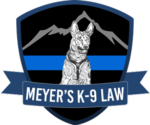Reasonable Expectation of Privacy (Standing); Traffic Stop; Odor of Marijuana as Probable Cause; Alert as Probable Cause
Traffic stop for expired registration. As LE approached, they could smell the odor of marijuana. Driver said the car was rented by his sister and he did not have the rental contract. The car was due back that day. One of the three other occupants was in possession of a burnt blunt. Driver was discovered to have a suspended license. All occupants were removed from the vehicle. PSD conducted a sniff and alerted between the font and rear passenger side of the vehicle. The vehicle was searched and marijuana and a handgun were found.
At the suppression hearing, driver testified that the renter of the vehicle was not his “real” sister, but he had permission from this person and driver believed the rental contract was ending a few days after the stop. Driver did acknowledge that he had since seen a copy of the contract and it had already expired. The renter did not testify. The trial court held that the driver had no reasonable expectation of privacy in the rental car (“standing”) that LE had probable cause to search the car.
The appellate court came to the same conclusions. To demonstrate “standing”, the driver must be able to show that he had a legitimate expectation of privacy in the area searched. Such an expectation of privacy is present when driver, by his conduct, exhibited a subjective expectation of privacy and that subjective expectation is one that society is prepared to recognize as reasonable in light of all the surrounding circumstance. Under Commonwealth v. Jones (Pennsylvania 2005) 2005 Pa. Super. 166, the appellate court held that the driver of a rental car does not have a reasonable expectation of privacy in that car when he is not the renter or named as a driver on the contract and the contract has expired. Here, the driver argued that the US Supreme Court case of Byrd v. U.S. (2018) 138 S. Ct. 1518 overruled Jones. Byrd stated that “As a general rule, someone in otherwise lawful possession or control of a rental car has a reasonable expectation of privacy in it even if the rental agreement does not list him or her as an authorized driver.” However, driver in the present case was not the sole occupant; the rental contract had expired, meaning that the vehicle was not legally on the road; and driver had a suspended license. Driver offered no proof that he was given permission to be in possession of the car other than his testimony that his not real sister gave him permission. The court found that lack of evidence compelling. The court found that driver had not demonstrated that he had standing, or a reasonable expectation of privacy in the vehicle. The court went on to hold that, even if standing had been shown, LE had probable cause to search the vehicle because LE smelled burnt marijuana and PSD alerted on the vehicle. The court rejected the argument that once LE saw the burnt blunt in a passenger’s hand, he was not legally able to continue looking for marijuana. The court indicated that the PSD alert added reasonable suspicion because he alerted to a different area of the vehicle from where passenger was seated. The court found that this alert indicated there was additional evidence in a different area of the vehicle (which there was).
